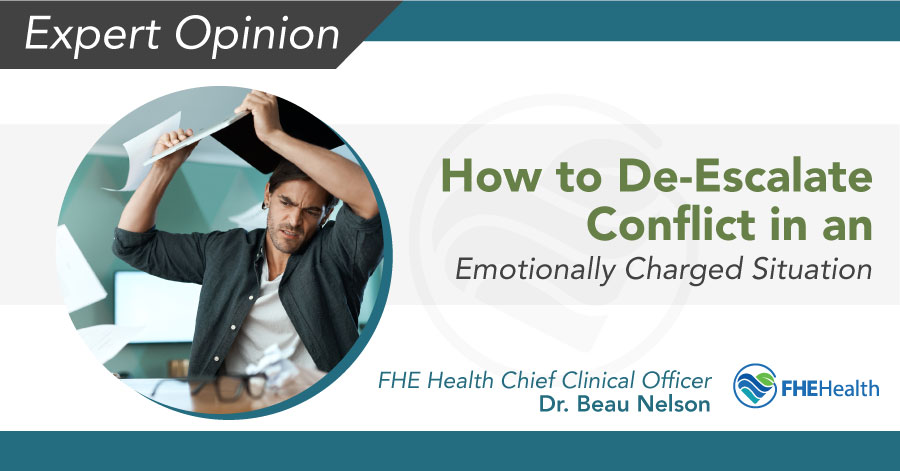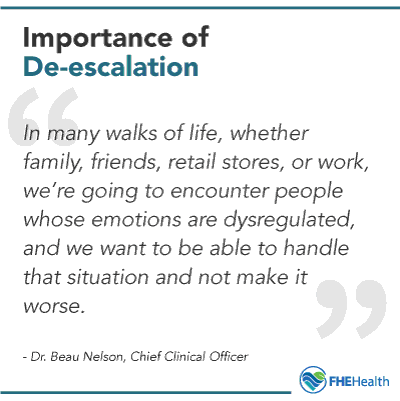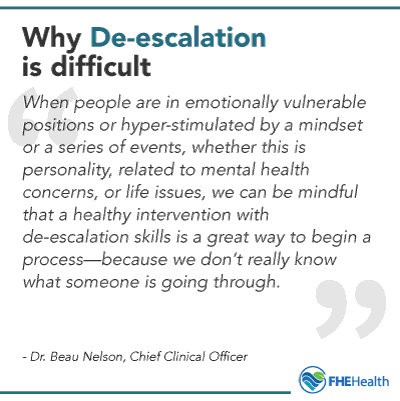
This article has been reviewed for accuracy by our peer review team which includes clinicians and medical professionals. Learn more about our peer review process.
Conflict is bound to happen, especially when Americans are more divided than ever, according to some sources. In families, schools, communities, and the workplace, the lines that divide can seem more worth fighting for than the ties that bind—and strong feelings can erupt in violence. From airline ticket counters and family dinner tables to town hall meetings and the Oscars, being able to de-escalate tensions has real benefits.
For advice in this area, we turned to FHE Health Chief Clinical Officer Dr. Beau A. Nelson. Dr. Nelson oversees the development and implementation of FHE Health’s treatment programs. He is also a licensed clinician whose specialization in cognitive-behavioral therapy (CBT) gives him expertise at helping people change self-defeating behaviors by correcting their thoughts. We began the conversation by asking Dr. Nelson why conflict de-escalation skills are important….
The Benefits of Conflict De-Escalation
 Why is conflict de-escalation important? “We’re all going to be faced with situations where we want to be able to handle them and create a good outcome,” Dr. Nelson said. “In many walks of life, whether family, friends, retail stores, or work, we’re going to encounter people whose emotions are dysregulated, and we want to be able to handle that situation and not make it worse.”
Why is conflict de-escalation important? “We’re all going to be faced with situations where we want to be able to handle them and create a good outcome,” Dr. Nelson said. “In many walks of life, whether family, friends, retail stores, or work, we’re going to encounter people whose emotions are dysregulated, and we want to be able to handle that situation and not make it worse.”
One key benefit of conflict de-escalation, then, is that it can prevent a bad or unpleasant situation from becoming worse. Another benefit is a sense of competence in the situation and “being able to achieve a goal.” The reverse is also true: “We don’t want to do something we regret”—so there is also a compelling rationale for not blowing up, especially when just a few seconds of losing your cool could become the next YouTube hit.
Depending on the context, effective de-escalation may also help get us what we want: “Most of us enter conversations with some sort of agenda or end point, so if we’re wanting to benefit from the dialogue, there will be two people participating and not one screaming at the other.” Mutual negotiation is more likely to achieve what you’re after.
And there are health benefits to consider. Anger and conflict “can lead to stress and anxiety—and not being capable to deal with the person or situation to avoidance of issues which can create more stress and anxiety,” Dr. Nelson said. (Unchecked stress can cause serious health problems.)
Why Conflict Can Be Hard to De-Escalate
 Knowing how to de-escalate conflict is also important because of the intensity of these encounters and the emotions involved. Anger, anxiety, or other emotions can override a person’s better judgment, even when safety and self-preservation are of paramount concern.
Knowing how to de-escalate conflict is also important because of the intensity of these encounters and the emotions involved. Anger, anxiety, or other emotions can override a person’s better judgment, even when safety and self-preservation are of paramount concern.
“The idea is that when people are too emotionally stimulated, they can’t process info. They’re in either a fight or flight mode, and our actions are self-defeating,” Dr. Nelson said. “When people are in emotionally vulnerable positions or hyper-stimulated by a mindset or a series of events, whether this is personality, related to mental health concerns, or life issues, we can be mindful that a healthy intervention with de-escalation skills is a great way to begin a process—because we don’t really know what someone is going through.”
As illustration of how a perceived justification to be angry can be a very wrong interpretation of reality, Dr. Nelson gave the example of “an employee who is tardy to work,” and you’re getting mad and you to go her and say, ‘You’re taking advantage of us,’ and she says, ‘My child has cancer.’ What a normal person would do with that anger is think, ‘I’m acting like a jerk.’”
How to De-Escalate an Angry Customer and Other Common Scenarios
“How to de-escalate an angry customer” is a popular inquiry on Google. It’s also an example of an emotionally charged situation that happens all the time and is replicated in other contexts. As a help in navigating these types of conflicts, Dr. Nelson offered the following tips:
- Don’t take on someone else’s emotions. You’re not responsible for their anger.
- Practice active listening. People want to be heard. If you’re talking in person, use body language (eye contact, nodding of the head, etc.) to convey you’re listening. Studies have found that tilting the head to the right, (as opposed to the left), is indicative of real listening.
- Use verbal and non-verbal communication to show that you care. So much communication is non-verbal. Our tone, affect, movement, body stance, and posture can tell a lot about whether we truly care, and we’re trained as human beings to recognize these signs before verbal ones. Show genuine concern for the person and avoid being passive or dismissive (for example, by rolling the eyes or slumping).
- Give the person permission to vent until they’re done. A person can only be panicked or full of rage for so long. They may have some level of irritability or frustration but can’t stay in a rage state for weeks on end. Allow them to be heard and usually, they will calm down.
- Give the person permission to vent until they’re done. A person can only be panicked or full of rage for so long. They may have some level of irritability or frustration but can’t stay in a psychotic rage for weeks on end.
- Remain calm and make statements that reflect back that you understand. ‘I understand that you’re upset. How can we help?’ The other person is trying to get something across to you.
- Start to problem-solve. Be forward-looking. Often you need each other or one another’s buy-in somehow. Focus on what can be gained from the conversation.
10 Domains of De-Escalation?
You don’t have to be familiar with the “10 domains of de-escalation” to successfully diffuse a brewing conflict. (These guidelines were meant to guide physicians’ interactions with agitated patients in psychiatric emergencies.) What can come in handy, in addition to the above tips and tools, is the self-awareness that “you need to be able to control your reactions.” Why? “In society today we’re seeing an ongoing problem with people feeling justified taking extreme measures,” Dr. Nelson said. “If anything, de-escalation skills are only going to become more important.”






